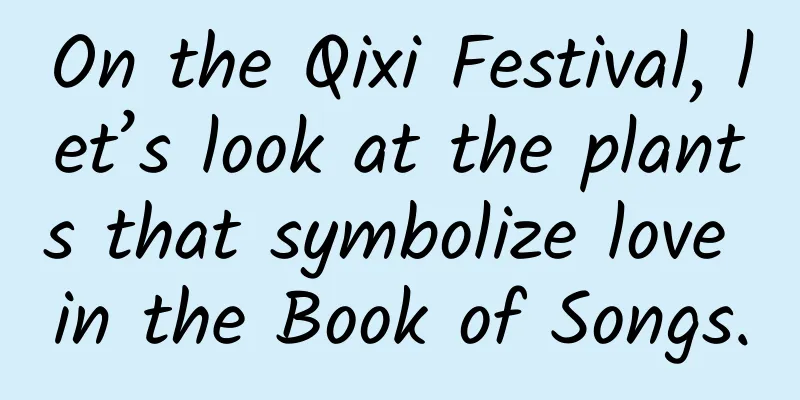On the Qixi Festival, let’s look at the plants that symbolize love in the Book of Songs.

|
Produced by: Science Popularization China Author: Li Bo (Shaanxi Institute of Biological Agriculture) Producer: China Science Expo Chinese people value friendship and often say: "People are not plants, so who can be heartless?" Plants and trees may seem heartless, but they have always been regarded as tokens of the human spiritual world since ancient times. The Chinese Valentine's Day is approaching quietly. How to express love with plants? Needless to say, our ancestors have given many examples in the Book of Songs. Those beautiful poems have been passed down for thousands of years, and they still make us feel moved when we read them today. Jian Jia - Romance of Love Reeds are lush and green, white dew turns to frost. The so-called sweetheart is on the other side of the water. Following her upstream, the way is long and obstructed. Following her downstream, she seems to be in the middle of the water. - "The Book of Songs • Qin Feng • Reeds" In the north, after the White Dew, reeds and reeds are in their prime. When the north wind blows, clusters of slender leaves emerge into graceful bouquets that sway in the wind like bird feathers. As a result, reeds have inspired countless literati to express their emotions, becoming the most romantic plant in the long history of Chinese culture. So much so that Wang Guowei, a great poet of poetry, also said in "Words on Human Poetry": "The poem "Reeds" is the most profound and romantic. In ancient Qin, most men were honest and not good at expressing themselves, preferring actions rather than words. So when they thought of the one in their hearts, they would leave "her" in the middle of the water, watching shyly from afar... Although Phragmites australis (above) and Reed (below) belong to the same family Poaceae, they are different genera. They are similar in habitat and morphology, but also have obvious differences (Photo credit: Photo by the author; Photo by Xunlu Lu) Thousands of years have passed, and it is impossible to verify who the "Yiren" in the poem is, and whether she really exists. However, "Qiu Shui Yiren" has become the consensus of the Chinese people for their beloved beauty, and reeds have become a symbol of romantic love. Reed marshes beside Yanming Lake in Xi'an (Photo source: Xunlu Photo) Plum - Desire for Love I have picked plums, and they have seven fruits. I have sought my common people, and waited for the good fortune. ——"The Book of Songs·Zhaonan·Picking Plums" This poem uses the number of plums remaining on the tree as a timeline to describe the girl's desire for love. The falling of plums from the tree is like the passing of the girl's youth, which makes people sigh and look forward to meeting a good man soon. The poem is short in words and the language is not gorgeous, but it depicts the girl's true emotions of spring love and longing for love in a delicate, vivid and vivid way. Plums usually bear fruit in May and June. The fruit is nearly spherical, yellow or greenish-white, covered with soft hairs, and tastes sour. (Photo source: Xunlu Photo) As a common native plant, the history of plum blossoms being eaten by our ancestors can be traced back to ancient times. While eating fruits to meet their material needs, the ancients also began to seek spiritual comfort from the natural beauty of plum blossoms. The famous line by Lu Kai, a poet of the Southern Dynasties, "I have nothing in Jiangnan, so I give you a branch of spring", shows that the plum blossom at that time had surpassed the image of expressing love in ancient times and became a beautiful symbol of friendship and family affection. Li Qingzhao is even more brilliant, "Seeing someone coming, her gold hairpins slip away from her socks. She goes away shyly, leans against the door and looks back, only to sniff the green plums." (From "Dian Jiang Chun") By playing with the green plums in her hands, the shy and curious feelings of the girl when she first falls in love are instantly brought to life on paper. To date, plum blossoms have been bred into nearly 400 varieties, becoming one of the most popular ornamental plants in spring. (Photo credit: The lower right picture was taken by the author, the rest were taken by Xunlu) Peach - Blessing of Love The peach tree is young and tender, and its flowers are bright and shining. The daughter is getting married, and she is suitable for her family... "The Book of Songs, Zhou Nan, Taoyao" is a poem that ancient people used to celebrate weddings and bless newlyweds. Although it only has a few dozen words, it depicts the beautiful scene of a girl getting married and wearing beautiful clothes through the repeated chanting of peach flowers, fruits and leaves. In particular, the word "bright" brings the girl's bright and moving image to life on paper through peach blossoms. Since then, peach blossoms have become "the ancestor of poetry and prose that chants beauties throughout the ages." Different flower shapes of ornamental peach: single petal type (A), plum blossom type (B), chrysanthemum type (C), rose type (D), peony type (E) and bell type (F) (Photo credits: A and B are taken by Tan Jizhao; C, D, E and F are taken by Xun Lulu) From the beginning of "Taoyao" to the prosperity of the Tang and Song dynasties, the beautiful peach blossoms have become the object of praise and eulogy in the writings of countless literati. Out of his love for nature, Tao Yuanming described a secluded, pleasant, and simple paradise in "Peach Blossom Spring". From then on, peach blossoms became a fascinating blessed land. A gentleman loves a beautiful lady. Poets not only love scenery, but also love beautiful women. Because of "Taoyao", peach blossoms have become the image of beauty, and then evolved into the embodiment of love and beauty in the eyes of literati. Last year at this time, the face of a man and the peach blossoms reflected each other. I don’t know where the face of a man has gone, but the peach blossoms still smile in the spring breeze. (Tang Cui Hu, “On the South Village of the Capital”). The same scenery, but two different moods. The poet encountered a beauty in spring but could not get her. I am afraid that only young boys and girls who have just begun to fall in love can understand the mood and taste. And this poem has become a famous poem that uses peach blossoms to describe beauty. Peppercorns – Love in Reward The fruit of the pepper is so abundant that it grows in abundance. Its offspring is so huge that it has no peers. Peppers are growing, and the branches are growing far away! (The Book of Songs, Tang Feng, Peppers) Sichuan pepper is a native species of China, and its earliest written record can be found in the Book of Songs. Although it is called "flower" pepper, its flowers are not very eye-catching. Every March and April of the lunar calendar, yellow-green cymes of small inflorescences grow on the thorny branches of the pepper tree. In autumn, they are covered with small red or purple fruits. The sight of the fruit-laden trees full of red and green has become the best symbol of love.
(Photo source: Xunlu Photo) At that time, productivity was very backward and people were the most important labor force, so reproduction was regarded as the most important and sacred mission. Therefore, humans consciously placed pious primitive worship on species with strong fertility in nature. "The fruit of pepper is abundant and growing" is to praise women by praising the abundance of pepper fruits, expressing the yearning for the reproduction of offspring and the prosperity of the population. And "I regard you as a thorn, and you give me a bunch of peppercorns." (See "The Book of Songs·Chen Feng·Dongmen Zhiwu") describes the scene of young men and women meeting and exchanging gifts. The man gave his lover a bunch of mallow flowers, and the woman gave her lover a bunch of fresh peppercorns in return. The tender girl was not only willing to endure the pain of picking peppercorns, but also willing to give herself to you and bear a bunch of children... Even if a thousand years have passed, I am afraid there will never be a more sincere return of love than this. Papaya - Promise of Love Throw me a papaya, and I will give you a jade pendant in return. It is not a reward, but a token of our everlasting friendship! - "The Book of Songs·Wei Feng·Papaya" This poem is a love song about young men and women giving each other gifts. The Book of Rites says: "It is not polite to go without receiving. It is also not polite to receive without receiving." China is a country of etiquette. Women often like to express their friendship with symbolic objects. Although the girl is enthusiastic and lively, she is also dignified. She inadvertently throws the papaya she just picked to her favorite lover, expressing her passionate love in an implicit way. The young man may have fallen in love with the girl a long time ago. Not only does he give back the beautiful jade in response, but he is also afraid that his feelings cannot be fully expressed, so he adds: This is not just a reciprocity, it is my promise to be with you forever! This extremely simple short poem vividly describes the beauty of mutual love and the grandeur of vows of eternal love. Through the plain words, countless men and women have been moved by the scenes it depicts for thousands of years, and have also longed for their own papaya and jade pendant. Papaya vs. Papaya (Photo credit: Photo by the author; cited from China Natural Plant Herbarium) It is important to emphasize here that the papaya mentioned in the Book of Songs is the fruit of the plant Malus pedunculata of the Rosaceae family, not the papaya we often eat in supermarkets today. As the name suggests, papaya is an alien species belonging to the papaya family. Although the fruits look similar and are both edible, papaya is now mainly used as medicine, while papaya is eaten as a fruit. Therefore, I would like to advise those young people who are eager to try their luck in pursuing love to choose the right fruit when expressing their love, so as not to make a fool of themselves. Malus chinensis is also known as papaya crabapple. In addition to its fruit being both edible and medicinal, it is also a popular landscape tree species due to its long flowering period and bright colors. (Photo source: Xunlu Photo) Peony - Witness of Love Beyond the Wei River, there is joy and happiness. The man and the woman tease each other and give each other a spoon of medicine. ——《The Book of Songs·Zhengfeng·Zhinwei》A narrative poem that looks like an everyday conversation, but it overflows with passionate, pure and straightforward love words. This concise poem reminds people of sweet and eternal love, and the grand occasion of the Shangsi Festival in ancient times, and the peony has naturally become the best witness of the love between men and women. Peony is also a native species of China, a perennial herbaceous flower belonging to the Ranunculaceae family. Peony has beautiful flowers and charming shapes. Although it is not as elegant as the peony, its soft, delicate and charming posture fully demonstrates the tenderness of oriental women. In addition, its flower colors are diverse and its fragrance is fragrant, making this flower have the beauty of color, fragrance, shape and charm, so it has the reputation of "flower fairy" and "flower phase". Peony (Photo source: Xunlu Photo) Peony, as the flower of love for Chinese people, has been popular since the pre-Qin period, and flourished in the Wei and Jin dynasties. In the Tang and Song dynasties, it was given spiritual temperament by literati. The great poet Qin Guan said in "Spring Day": "The affectionate peony contains spring tears, and the weak rose lies on the branches in the morning." Poets have endowed peony with a passionate, independent and unworldly personality, making it the best token for men to give to their beloved. Mugwort - Love and longing Red beans grow in the south, and they sprout in spring. I wish you would pick more of them, for they are the best for expressing longing for love. -- Wang Wei, Tang Dynasty, "Longing for Love". Wang Wei's poem is a masterpiece of all ages, and it made red beans a symbol of love among the people. Since then, young men and women often give each other red beans as tokens of love to express their longing for each other. As the Yuan Dynasty poet Xu Zaisi said: "If you have never felt lovesickness in your life, you will feel it and suffer from it." (Zheguiling•Spring Feelings) Lovesickness is probably an unforgettable experience for everyone who has experienced love. However, before the Tang Dynasty, the plants that ancient people used to express lovesickness were not red beans, but some unprepossessing wormwood. He is picking kudzu, if I am not seen for a day, it feels like three months! He is picking mugwort, if I am not seen for a day, it feels like three autumns! He is picking mugwort, if I am not seen for a day, it feels like three years! - The Book of Songs, Wang Feng, Picking Kudzu Kudzu, also known as Pueraria lobata, is a common vine in the leguminous family. Its rhizomes are edible, and its fibers can be used to weave hemp ropes. The "Ai" in "Picking Ge" refers to mugwort. Mugwort does not have a charming shape or fragrant flowers, but in ancient times, this humble mugwort was a good medicine for curing diseases and saving lives. It is precisely this ordinary thing that we see every day when we work that can best evoke our thoughts for the people we care about. Perhaps, the people who picked it wanted to use it to cure the most difficult lovesickness in the world. Love stories in the world always follow three themes: the joy of meeting, the longing for love after separation, and the disappointment of eternal reunion. Although "Picking Ge" only describes the long separation, "One day without seeing you feels like three autumns", it has aroused countless longings in later generations. It is the word "autumn" that constitutes the fulcrum of love and longing in the whole poem. As for meeting and eternal reunion, it is left to the readers of later generations to think, miss, grieve, be sad, be happy, and be delighted... Mugwort (Photo source: Xunlu Photo) Conclusion Coming from the wildness of slash-and-burn farming, humans have established deep feelings with plants over thousands of years, and have also inspired their endless imagination and creativity through their wisdom. Plants are endowed with human spirituality and emotions through poetry, becoming a sweet helper for us to obtain beautiful love. Acknowledgements We would like to thank Mr. Xun Lulu and Mr. Tan Jizhao from Xi'an Botanical Garden, Shaanxi Province for providing a large number of precious photos and valuable suggestions for writing this article. References: 1. Flora of China Mobile Edition 2. Cao Yin et al. Complete Tang Poems[M]. Beijing: Zhonghua Book Company, 2013 3. Wu Qijun. A Categorical Study of Plant Names and Figures[M]. Beijing: Zhonghua Book Company, 2018. 4. Lu Ji. Mao Shi: Plants, Birds, Beasts, Insects and Fishes, Beijing. Zhonghua Book Company, 1985. 5. Sun He. A Study on Wedding Congratulatory Poems in the Book of Songs. Young Writers, 2023, 17 6. Luo Guihuan. A brief study on the history of Mei. Journal of History of Natural Sciences, 2013, 32(1): 64-71 7. Wei Wei et al. Research on reed and reed. Journal of Beijing Forestry University (Social Sciences Edition), 2010 |
<<: Want to eat all the crayfish? First figure out: where are you eating crayfish from?
>>: The world's lightest and smallest micro-aircraft is powered only by natural light
Recommend
Why Apple and Google came together? The story behind the development of the contact tracing API
Recently, Apple and Google announced that they wi...
Essential for increasing followers: Learn the fission promotion methodology in 5 minutes!
Written in front I personally participated in a c...
As semiconductor giants compete in autonomous driving, how much chance does Intel, which acquired Mobileye, have?
Intel, which stuck to the X86 chip architecture, ...
Sanlimi "100% Complete Case Transaction" 4 sections, 25 steps, 100 tricks for the whole case process, operation class
Sanlimi's "100 Complete Cases" cove...
Operation and development of cash loan products
After being exposed to cash loans for some time, ...
What are the main methods of Internet marketing and which ones are the most effective?
Nowadays, any company must do marketing and promo...
The inspiration I got from writing code with my eyes closed
[[127460]] I am a programmer, and I am also a bli...
Kuaishou account cold start tips and operation guide!
How to cold start a new short video account is a ...
The world's first! Chinese scientists reveal details of its birth
Scientists reveal details of the creation of a hi...
Android Performance Optimization: Computing
Google recently released an online course on Andr...
The “traffic pool” of programmatic advertising: SSP
The SSP platform is an advertising platform that ...
An Air China flight encountered clear sky turbulence, and a passenger and stewardess were thrown to the top of the cabin! Why are planes getting more and more turbulent nowadays?
On July 10, many netizens posted on social media ...
What is the difference between Baidu Promotion Assistant's quick search and advanced search?
For novice friends who have just entered the indu...
I've experienced the iPhone SE2 for a day, and I've talked about its pros and cons. I understand it after reading it.
On April 24, 2020, Apple started selling the seco...
With an accuracy rate of over 98%, AI unlocks a new way to screen for cancer early! Will the era of early cancer treatment be here?
Cancer has always been one of the most challengin...









